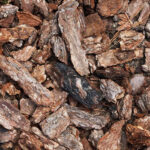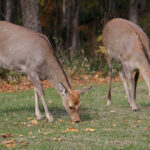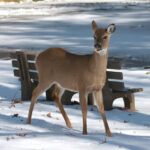Maintaining a healthy garden isn’t easy. If your property has deer regularly visiting and making a mess of your garden, you suddenly have a whole new challenge to contend with. Namely, how do you keep pesky deer from eating your plants?
Neem oil has gained a lot of attention recently as a safe and effective means of deterring agricultural pests.
Many people have started using neem oil deer repellent as well, but does it really work?
In this article, we will take a look at the effectiveness of neem oil as a deer repellent and offer some alternative deer-deterring strategies for you to try.
Table of Contents
- Is Neem Oil Deer Repellent Effective?
- Alternative Deer Repellent Strategies
- How Long Do Homemade Deer Repellents Last?
- Final Thoughts
Is Neem Oil Deer Repellent Effective?
There has been some research that suggests neem oil is effective at repelling a variety of insects and rodents, but there is no hard evidence that it is effective at repelling deer. However, we have found some anecdotes of people trying neem oil as a deer repellent with some success.
It seems that neem oil offers a moderately effective means of repelling deer if used correctly and reapplied regularly.
Neem oil can be made much more effective if you mix it with capsaicin (the chemical that makes peppers spicy) or vinegar. This gives your repellent an even more noxious odor to help keep deer away.
Regardless of what repellent you are using, it will be the most effective if you apply it in the path that the deer uses on a daily basis.

What Is Neem Oil?
Neem oil is a concentrated oil extracted from the seed of the neem tree. Indigenous to India and Sri Lanka, neem trees are now grown all over the world.
Neem oil is yellow/brown with a garlicky/sulfurous smell and a bitter taste. It can be found in a variety of products like cosmetics and soaps.
Most notably, neem oil has gained a reputation for being a natural pesticide, used on crops and ornamental plants as a means of repelling insects.
How Does Neem Oil Repel Deer?
Neem has a strong odor that deer find repulsive. When you spray neem oil on your plants, it also gives the leaves and stems a bitter taste that the deer like to avoid.
The problem with neem oil is that it can degrade with UV exposure and wash away in rain. If you are inconsistent with reapplying it to your plants, deer will jump at the opportunity to feed on your garden.
Benefits Of Neem Oil
There is plenty of benefit to using neem oil as a pesticide or a deer repellent. It is effective at deterring unwanted insects while being relatively harmless to many helpful insects like worms, ladybugs, spiders, and bees.
The main benefit is that neem oil breaks down much better than traditional pesticides, and doesn’t harm the soil when it washes away.
It is also relatively safe for humans to come in contact with neem. It is non-toxic but still should not be ingested as it can cause irritation to your eyes, skin, or stomach and it may negatively impact fertility.
It may also cause Reye syndrome when ingested by small children, which can lead to serious symptoms like recurrent seizures and hepatic failure.
Alternative Deer Repellent Strategies

Neem oil may be a moderately effective deer repellent, but it is not the only option and is likely not the best option. Here we will introduce several alternatives for deer repellents that can be as effective or more effective than neem oil.
Fences
Probably the most effective deer deterrent is a good ol’ fashion fence. This is an expensive solution, and not necessarily the best choice aesthetically, but it does work.
Deer can jump over an 8-feet high, so one strategy is to build a fence at least that tall. Another strategy is to take the ‘work smarter, not harder’ approach and use a fence that will scare the deer away.
Electric fences are, of course, an effective option. However, stringing a few strands of thin wire across some fence posts is nearly as effective and cheaper.
Noise Making Devices
Another effective deer-repellent solution is to use what is effectively an invisible fence–a noise-making device or “ultrasonic animal repeller”.
These devices can be motion censored and will release an unpleasant noise to keep deer and other animals away. Usually, these sounds are emitted at a frequency above human hearing capabilities so you and your family are not disturbed.
Commercial Deer Sprays
Some commercial deer repellent sprays use neem oil as an active ingredient, but there are a variety of options available.
Commercial deer sprays tend to be a bit more effective than their DIY counterparts. Most notably, commercial sprays tend to stick onto plants longer than homemade solutions.
Some commercial sprays leave a particularly unpleasant scent, while others smell pleasant to our noses but putrid to deer.
You might have to experiment with a few options to find ones that work well and that you can tolerate.
Homemade Deer Repellents
There are dozens of homemade deer repellent recipes and techniques floating around on the internet. Many of them seem to be about as effective as commercial sprays or neem oil, but do need to be reapplied regularly.
In the end, it is clear that deer have an incredibly good sense of smell. For instance, many hunters rightfully worry if deer can smell vape or other products that they may use while hunting.
One common method is to mix egg with water and your choice of other smelly substances like milk, dish soap, garlic, and/or essential oils.
The resulting spray ends up smelling like rotting eggs mixed with whatever else you add and does a good job of repelling deer.
There are many other essential oils or scents that you can turn into sprays much like neem oil. Deer have a very sensitive sense of smell so will try to avoid many powerful scents. Here are some common oils or scents to try:
- Marigold
- Mint
- Rosemary
- Sage
- Lavender
- Tansy
- Garlic
You can mix these with other strong smells like capsaicin or vinegar into a spray, or pack a bunch of strong-smelling substances into tea bags or similar and hang them at nose height for the deer to bump into.
For another cheap option, you can cut up bars of soap, pack them in socks, and hang them at nose height. Again, you can add other scents if you want to.
Especially for DIY methods, the best strategy is to routinely switch the method you choose. Deer can adapt to the scents that you spray or hang in your garden, so changing your strategy will keep the deer on edge and wary of your plants.
Similarly to other sprays, you should apply it in the area where deer actively move. Additionally, you may want to apply it later at night or earlier in the morning so that it is strong right before deer tend to be active.
How Long Do Homemade Deer Repellents Last?
Homemade oil sprays can last up to 4 weeks without rainfall but should be reapplied if it does rain.
Egg mixtures can typically last up to 2 weeks without rainfall, and soap hangs will last until the soap dissolves from moisture.
Final Thoughts
Neem oil can be effective for repelling deer, but it might not be the best option for your garden. To improve the effectiveness of neem oil, mix it with some capsaicin or other smelly substances like garlic or vinegar.
You might also want to try using neem oil as a part of a rotating array of deer repellent sprays, or investing in more mechanical solutions like a fence or a noise maker.






